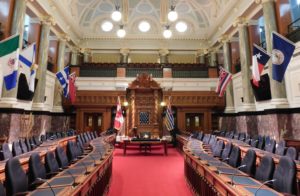Clean Energy Canada | B.C. Budget Update Aims to Create Opportunity While Cutting Pollution
September 11, 2017

VANCOUVER—Dan Woynillowicz, policy director at Clean Energy Canada, made the following statement in response to the B.C. government’s Budget 2017—September Update:
“The B.C. government committed to decisive action to address climate change, and has begun delivering just that with today’s budget update. Resuming predictable increases to the carbon tax will help the province get back on track for reducing pollution.
“Putting carbon tax revenues towards climate solutions, while also ensuring British Columbians with low and modest incomes are supported, is an effective approach. Good policy design can readily maintain the competitiveness of B.C. businesses that are trade-exposed.
“Phasing out the provincial sales tax on clean electricity will help make B.C. businesses more competitive. It will also serve as an incentive to switch from fossil fuels to electricity, further cutting pollution and enhancing low-carbon competitive advantage.
“The transition to clean energy—not just in B.C. but in countries around the world—is creating new opportunities for businesses that offer technologies and services that deliver clean energy and enhance energy efficiency. The growth of clean energy is also sparking increased demand for many of the metals and minerals produced in B.C. The creation of an Emerging Economy Task Force should help ensure B.C. businesses and British Columbians can capitalize on this opportunity.
“From cleantech, to mining, to forestry and other sectors, British Columbians and local businesses will benefit from leadership that cuts pollution and creates opportunity, and today’s budget update takes B.C another step down this path.”
KEY FACTS
- Clean Energy Canada’s 2017 report Mining for Clean Energy, which focuses on the metal and mineral requirements for solar power, finds that Canada could emerge as a key supplier of these resources. Canada is home to 14 of the 19 metals and minerals needed for solar panels.
- A 2015 study by Clean Energy Canada and Navius Research found that strong climate leadership would attract an additional $5 billion of renewable energy investment to B.C. over the coming decade. It estimates that, with a well-designed clean growth and climate strategy, 270,000 jobs would be created in B.C. by 2025, including 210,000 jobs added in the knowledge and service sector, 35,000 in the resource sector and 29,000 in clean energy and technology.
- Households stand to benefit too. New climate policies would help British Columbians save money by using less energy. An average rural household would save $1,200 a year and urban households would save roughly $900 a year, by replacing worn-out furnaces and old vehicles over the next 15 years.—